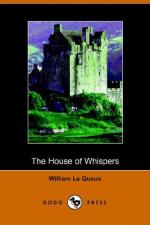“Well, the reason of its downfall was Lord Glencardine’s change of front,” he answered. “In 1638 he became a stalwart supporter of Episcopacy and Divine Right, a course which proved equally fatal to himself and to his ancient Castle of Glencardine. Reid, in his Annals of Auchterarder, relates how, after the Civil War, Lord Dundrennan, in company with his cousin, George Lochan of Ochiltree, and burgess of Auchterarder and the Laird of M’Nab, descended into Strathearn and occupied the castle with about fifty men. He hurriedly put it into a state of defence. General Overton besieged the place in person, with his army, consisting of eighteen hundred foot and eleven hundred horse, and battered the walls with cannon, having brought a number of great ordnance from Stirling Castle. For ten days the castle was held by the small but resolute garrison, and might have held out longer had not the well failed. With the prospect of death before them in the event of the place being taken, Dundrennan and Lochan contrived to break through the enemy, who surrounded the castle on all sides. A page of the name of John Hamilton, in attendance upon Lord Dundrennan, well acquainted with the localities of Glencardine, undertook to be their guide. When the moon was down, Dundrennan and Lochan issued from the castle by a small postern, where they found Hamilton waiting for them with three horses. They mounted, and, passing quietly through the enemy’s force, they escaped, and reached Lord Glencardine in safety to the north. On the morning after their escape the castle was surrendered, and thirty-five of the garrison were sent to the Tolbooth of Edinburgh. General Overton ordered the remaining twelve of those who had surrendered to be shot at a post, and the castle to be burned, which was accordingly done.”
“The country-folk in the neighbourhood are full of strange stories about ghostly whisperings being heard in the castle ruins,” she remarked.
Her father started, and raising his expressionless face to hers, asked in almost a snappish tone, “Well, and who has heard them now, pray?”
“Several people, I believe.”
“And they’re gossiping as usual, eh?” he remarked in a hard, dry tone. “Up here in the Highlands they are ridiculously superstitious. Who’s been telling you about the Whispers, child?”
“Oh, I’ve learnt of them from several people,” she replied evasively. “Mysterious voices were heard, they say, last night, and for several nights previously. It’s also a local tradition that all those who hear the whispered warning die within forty days.”
“Bosh, my dear! utter rubbish!” the old man laughed. “Who’s been trying to frighten you?”
“Nobody, dad. I merely tell you what the country people say.”
“Yes,” he remarked, “I know. The story is a gruesome one, and in the Highlands a story is not attractive unless it has some fatality in it. Up here the belief in demonology and witchcraft has died very hard. Get down Penny’s Traditions of Perth—first shelf to the left beyond the second window, right-hand corner. It will explain to you how very superstitious the people have ever been.”




